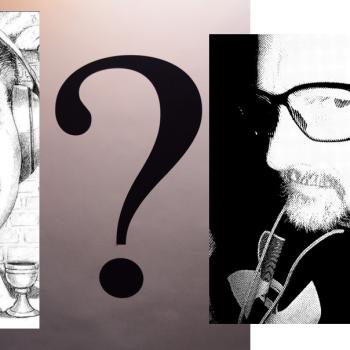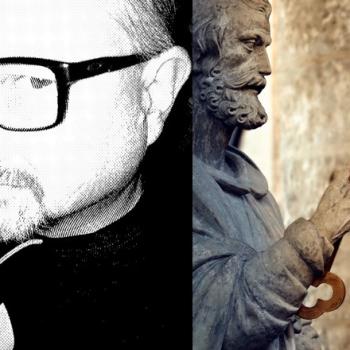While attending Confession on Saturday, God spoke to my spirit in a special way as I contemplated the Act of Contrition. For non-Catholics, the Act of Contrition is what Catholics say (and hopefully mean) before the priest gives absolution. After reading and writing on Cardinal McElroy’s comments on grave sin, I thought of the role of sin in my own life and how I depend on the mercy and grace of God. The Act of Contrition places my sin in the context of my love for God. God does indeed love me, but do I return that love with love?
Act of Contrition
My God,
I am sorry for my sins with all my heart.
In choosing to do wrong
and failing to do good,
I have sinned against you
whom I should love above all things.
I firmly intend, with your help,
to do penance,
to sin no more,
and to avoid whatever leads me to sin.
Our Savior Jesus Christ suffered and died for us.
In his name, my God, have mercy.
My God…
First off, it starts with a relationship. God is not just “God” or “Lord,” but my God. I am His and He is mine. Not mere sentimentality, this relationship touches the deepest core of my being. Also inherent in any relationship is mutual responsibility. In other words, healthy relationships are two-way streets.
I am sorry for my sins with all my heart.
Next, it gets right to the heart—my heart. Am I truly sorry for my sins? Furthermore, am I sorry “with all my heart”? Everyone must answer this question themselves. As for myself, I certainly hope so. Habitual sins appear to be the most common sins we confess, and I, too, fall into this category of sinner.
In choosing to do wrong…
Furthermore, I choose to do wrong. Nobody forces me. This struggle represents a daily battle between the “spirit” and the “flesh.” As St. John Paul II stated:
For the Apostle it is not a matter of despising and condemning the body which with the spiritual soul constitutes man’s nature and personal subjectivity. Rather, he is concerned with the morally good or bad works, or better, the permanent dispositions—virtues and vices—which are the fruit of submission (in the first case) or of resistance (in the second case) to the saving action of the Holy Spirit. For this reason, the Apostle writes: “If we live by the Spirit, let us also walk by the Spirit.” St. John Paul II, Dominum et Vivificantem, 55
And failing to do good…
Moreover, my inaction in doing good also plays a significant role in my sin. I must not only avoid sin, I must also do good. I must live like my life has a specific destination—heaven. Do my actions reflect my destination per Micah 6:8?
He has told you, O man, what is good; and what does the Lord require of you but to do justice, and to love kindness, and to walk humbly with your God?
I have sinned against you whom I should love above all things.
Here, we see again the relational come again to the foreground. Sin harms our relationship with God, and grave sin (sexual or not) can break it. Why? We should love God above all things. God, as the giver of life, as the source of all good, and the one who provided for our salvation in Christ, deserves our full love. But this love, freely given by God, must then freely return to God.
My Lord and my God, take from me everything that distances me from you.
My Lord and my God, give me everything that brings me closer to you.
My Lord and my God, detach me from myself to give my all to you.
St. Nicholas of Flüe
I firmly intend, with your help, to do penance…
What is penance? The Catechism of the Catholic Church puts it beautifully in paragraph 1431:
Interior repentance is a radical reorientation of our whole life, a return, a conversion to God with all our heart, an end of sin, a turning away from evil, with repugnance toward the evil actions we have committed. At the same time it entails the desire and resolution to change one’s life, with hope in God’s mercy and trust in the help of his grace. This conversion of heart is accompanied by a salutary pain and sadness which the Fathers called animi cruciatus (affliction of spirit) and compunctio cordis (repentance of heart).
Penance is impossible without God’s assistance through grace. This grace helps us truly experience sorrow for our sins and strengthens us to radically “reorientation of our whole life” towards God.
To sin no more and to avoid whatever leads me to sin.
Jesus stood up and said to her, “Woman, where are they? Has no one condemned you?” She said, “No one, Lord.” And Jesus said, “Neither do I condemn you; go, and from now on sin no more.” John 8:10-11
The above part of the Act of Contrition comes directly from the passage in John where Jesus encounters the woman caught in adultery. Jesus does not condemn the woman and forgives her sin. He also admonishes her to “sin no more.” As with penance, this comes only with God’s assistance through grace. But here, too, we see a call to “radical reorientation of our whole life” as we not only “sin no more,” but avoid whatever leads us to sin. Each deal with their own habitual sins and with God’s help they must endeavor to avoid what leads lead them down the path away from God and towards sin.
Our Savior Jesus Christ suffered and died for us.
Freedom from sin and the healing caused by sin’s damage comes through the suffering and death of our savior Jesus Christ. This pain and suffering was done out of love, not to appease a vengeful God. Again, the Catechism states in paragraph 616:
It is love “to the end” that confers on Christ’s sacrifice its value as redemption and reparation, as atonement and satisfaction. He knew and loved us all when he offered his life. Now “the love of Christ controls us, because we are convinced that one has died for all; therefore, all have died.” No man, not even the holiest, was ever able to take on himself the sins of all men and offer himself as a sacrifice for all. The existence in Christ of the divine person of the Son, who at once surpasses and embraces all human persons, and constitutes himself as the Head of all mankind, makes possible his redemptive sacrifice for all.
Therefore, through this act of pure love, we become free from sin. Christ offers this freedom as a free gift, but we must accept it.
In his name, my God, have mercy.
Moreover, at the end of our lives, as at the end of the Act of Contrition, we hopefully find God’s mercy through Christ. And again, at the end, we find the relational brought to the forefront in the appeal to “my God, have mercy.” We stumble, we fall, we desperately need the mercy of God.
If you are Catholic and have not been to confession in a while, I encourage you to GO. Go experience the mercy of God through Christ. Experience the healing waiting for you. Experience the love of God. Amen.
If you enjoy my writing and want to support my work, please consider donating a monetary gift of any size or quantity by clicking here. Thank you!
Read my other writing here.
Please click the link below to join.
Voices of the Faithful in the Synod on Synodality
Please make your voice heard.
I Support Church Teaching in the Synod of Synodality

















